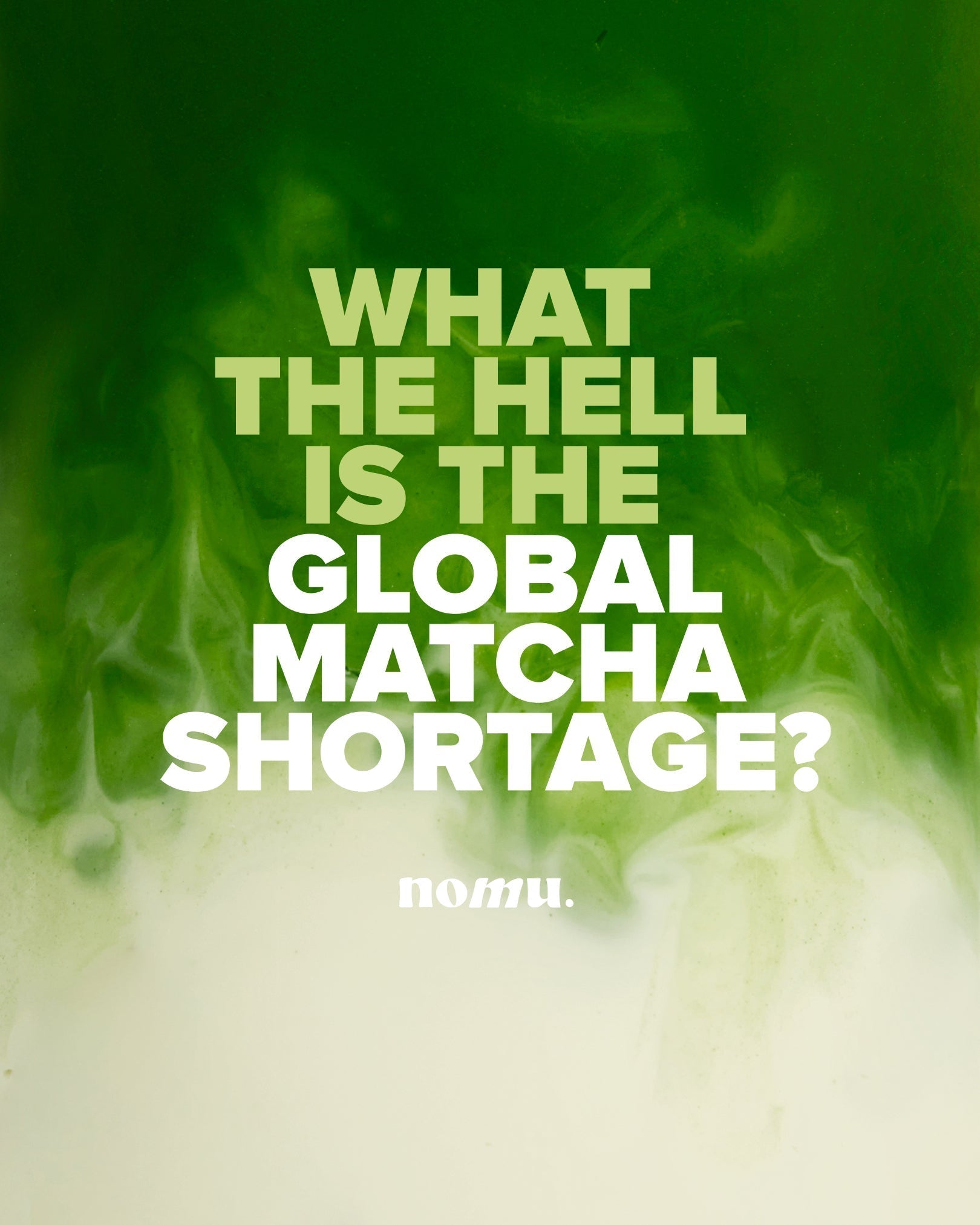Matcha Shortages Explained: Why Supply Can’t Keep Up (And Why Nomu Refuses to Cut Corners)

You’ve seen the headlines everywhere, so what does the global matcha shortage actually mean? Last month, we travelled to meet our supplier in Japan to:
-
Learn more about the shortage at a farm and manufacturing level
-
Understand how we can support them as a partner and customer
-
Despite the pressures, nail down how we continue to bring no sh!t matcha to you
One thing that's sure: matcha isn’t just trending, it’s booming. From functional wellness trends to TikTok virality, global demand for Japanese matcha has tripled since 2010. But here lies the problem: Japan’s tea farms and traditional grinders can’t keep pace.
The result? Supply shortages, higher matcha prices, and more low-quality matcha powders flooding the market. If you’re wondering why we keep selling out (beyond our Drinkers not being able to get enough) and other brand's prices are increasing — here’s why.
1. The Farms: Patience Isn’t Optional
You can’t rush matcha. Tencha plants take around three years before they’re ready to harvest. With demand tripling over the last decade, farmers simply can’t plant their way out of this crunch (Time).
On our trip to Japan, our Supplier informed us that this year, for the first time in centuries, farmers are prioritising ichiban harvests (the prized first flush) and reducing later niban harvests to produce more ceremonial grade matcha. Add in climate stress and Japan’s aging farmer population, and supply tightens further (Perfect Daily Grind).
Nomu's Take: We’ve always worked directly with trusted third-generation growers in Uji. That means no middlemen, no uncertainty. While others scramble for supply, our relationships help us keep Nomu’s quality and sourcing rock solid.
The result? Fewer raw tencha leaves on the market — and a greater need for transparency from brands.
2. The Grinders: The Bottleneck No One Can Ignore
Even if the farms could deliver more leaves, another problem looms: grinding. Traditional stone mills produce just 30–40 grams per hour and that’s about one of our 40g tins, ground over a full hour (News.com.au).
Unlike other machinery, you can’t mass-produce stone grinders. They’re built for precision, not speed. And as global demand grows, the grinders can’t keep up.
Nomu’s Take: We respect the slow process. That’s why every tin of Nomu is a product of craft, not compromise. We’d rather sell out than push an inferior product.
The result? A true production bottleneck — and longer lead times across the industry.
3. The Demand: TikTok Meets Tradition
The “Matcha Boom” is real. Social media has turned this ancient tradition into a global trend. Kyoto auction prices for ichiban tencha spiked +170% year-on-year in 2025. In Uji, output dropped 40–60% due to heatwaves (Straits Times).
Scarcity plus hype has created the perfect storm: skyrocketing prices, empty inventories and opportunistic brands cashing in.
Nomu’s Take: We don’t play the scarcity gimmick. Yes, matcha is harder to get right now. Yes, we keep selling out. Yes, costs are up (but we're not increasing prices right now — you're welcome). But we’ll never turn to fillers, blend in lower grades or slap on “ceremonial” if it isn’t. If it’s Nomu, you know it’s the best of Uji and nothing less.
The result? Major price increases and, unfortunately, false claims from some players in the market (AP News).
4. Where Others Cut Corners, Nomu Doubles Down
This is where the industry often veers off track. We’ve seen more matcha blends mislabeled as ceremonial, fillers added to bulk out tins, and marketing claims stretched past breaking point.
But Nomu isn’t built on shortcuts.
-
Direct sourcing from an Uji third-generation family business
-
Lab-tested batches to prove health benefits (not just promise them)
-
Zero compromises: no fillers, no fake ceremonial, no BS
Our promise is simple: you know exactly what’s in your tin, every single time.
5. Looking Ahead
The global matcha market is forecasted to hit $7 billion by 2030. But supply challenges aren’t going away: climate impacts, slow-growing plants and limited grinding capacity will keep the pressure on.
Which means trust matters more than ever.
Nomu’s Take: We built Nomu for this exact moment. When the world is flooded with hype and half-truths, we’re here with the receipts. Our “No Sh!t” strategy isn’t a tagline — it’s how we operate, every day.
Our No Sh!t Strategy
Demand is booming. Supply is strained. Prices are rising. And brands are beginning to cut corners.
But Nomu Matcha is different — we always have been. From the fields of Uji to your cup, we deliver transparency, quality and authenticity. No fillers. No fake ceremonial claims. No sh!t matcha.
Never drink a sh!t matcha again.
Read more about Nomu Matcha and our ambition to never drink a sh!t matcha again.
